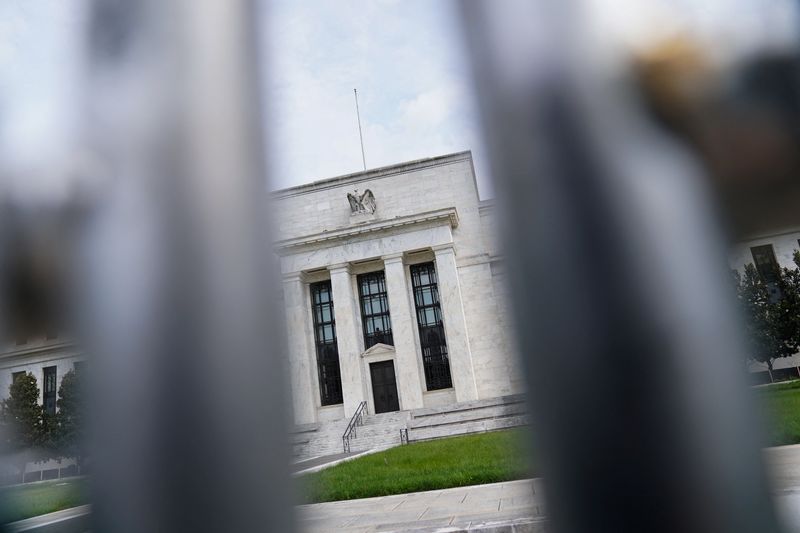By Noreen Burke
Investing.com -- The latest U.S. inflation numbers on Thursday will be keenly awaited by investors who have repeatedly had their hopes dashed for a pivot away from an aggressive rate hike campaign by the Federal Reserve. Wednesday’s minutes of the latest Fed meeting should offer some insights into how officials view the economy and the inflation outlook. Comments during the week by several Fed policymakers will also be closely watched. Big bank earnings on Friday are expected to show the impact of rising interest rates and market volatility. Oil prices will remain in the spotlight after OPEC+ announced its largest supply cut since 2020 and in the U.K. a barrage of economic data will test the recovery in sterling. Here’s what you need to know to start your week.
- U.S. inflation numbers
Another elevated inflation reading on Thursday would underline the case for even more hawkishness from the Fed after Friday’s jobs report indicated that the labor market remains robust despite the Fed's efforts to bring down high inflation by weakening growth.
While economists expect the headline rate of inflation to moderate, core inflation, which strips out food and fuel costs, is expected to accelerate in September, keeping the Fed on track for a fourth consecutive 75 basis-point rate hike in November.
Retail sales data on Friday is expected to show a modest increase for September as auto sales rebounded.
The economic calendar also features data on consumer sentiment which should show how U.S. consumers are faring after months of tighter monetary policy, along with data on initial jobless claims and wholesale price inflation.
- Fed minutes, speakers
Wednesday’s minutes of the Fed’s latest meeting will provide more insights into policymakers' view of where inflation stands and the outlook for the future path of interest rates.
Investors will also get to hear from several Fed officials during the week, including Vice Chair Lael Brainard, New York Fed President James Bullard, Cleveland Fed President Loretta Mester and Chicago Fed head Charles Evans.
Recent comments by Fed officials have indicated that turbulence in financial markets would not deter them from acting to lower inflation, which by the central bank’s preferred measure is running at more than three times its target.
Equity markets have been hard hit by fears that aggressive monetary tightening by the Fed could tip the economy into recession.
- Big bank earnings
Big U.S. banks are to kick off quarterly corporate earnings on Friday amid concerns over the impact of rising interest rates. Four of the nation's largest lenders - JPMorgan Chase (NYSE:JPM), Wells Fargo (NYSE:WFC), Citigroup (NYSE:C), and Morgan Stanley (NYSE:MS) - are due to report third-quarter earnings ahead of Friday's open.
Analysts expect the results to show a slide in net income after market volatility hit investment banking activity and lenders set aside more rainy-day funds to cover losses from borrowers who fall behind on their payments.
Banks typically earn more when interest rates rise because they can charge customers more to borrow, but higher borrowing costs also impact on demand for mortgages and other loans.
"We expect moderate, yet increasing, negative impact on banks' asset quality and loan growth stemming from the higher rates, inflation and a mild recession in the U.S., negating some of the benefits of higher rates," analysts at Fitch Ratings wrote in a report.
- Oil prices
Oil prices look likely to remain in the spotlight after rallying to five-week highs on Friday, despite the stronger dollar, after OPEC+’s decision to cut oil production in the face of stiff U.S. pressure to keep global oil prices down.
The Organization of the Petroleum Exporting Countries and allies including Russia, known as OPEC+, plans to lower their output target by 2 million barrels per day ahead of a European Union embargo on Russian oil, pressuring supply in an already tight market.
"Among the key ramifications of OPEC's latest cut is a likely return of $100 oil," Stephen Brennock of oil broker PVM told Reuters.
UBS Global Wealth Management also projected Brent would "move above the $100 bbl mark over the coming quarters."
U.S. Treasury Secretary Janet Yellen said the decision was "unhelpful and unwise" for the global economy, especially emerging markets, in an interview published in the Financial Times on Sunday.
5. U.K. data
The Bank of England’s Financial Policy Committee is to publish meeting minutes on Wednesday. The committee oversaw last month’s emergency intervention to stabilize bond markets after the government’s mini budget, and the minutes may give some insight into the risks facing pension funds and the implications of sharply higher mortgage rates.
The U.K. is to publish employment data for August on Tuesday, followed a day later by GDP figures for August along with data on industrial output and the trade balance.
Weak economic data could add to pressure on the government to deliver longer-term growth plans.
Investors are betting on the BoE hiking interest rates by a full percentage point at its next meeting in November to tackle an inflation rate currently touching 10%. Planned tax cuts by the new government are expected to fuel inflation.
--Reuters contributed to this report
